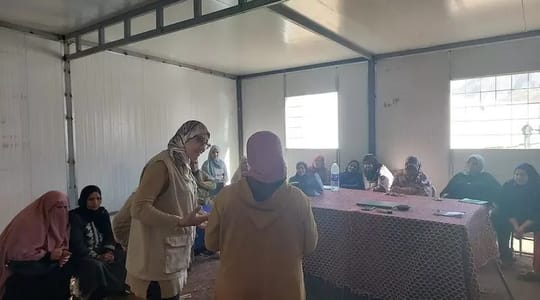Over three months have passed since the devastating earthquake that occurred in the region of Al-Houz and other affected areas on September 8, 2023, with a reported toll of 5,500 injured and 2,900 fatalities, including 86 individuals from Douar Amkdoul in the municipality of Talat N’ayacoub in the Al-Houz province, among them 21 children. Each person affected by this tragedy has lost more than one family member, whether from their immediate or extended family.
From a distance, it may seem as if life is back to normal and everything is fine. However, each step forward reveals shocking scenes that make it apparent that the earth has split open and swallowed everything in its path.
During our interactions with the community members, we have come to realize the vital importance of providing psychosocial empowerment. This support is offered through workshops organized by the High Atlas Foundation in partnership with Project HOPE. The aim is to help women and children affected by the earthquake regain a sense of normalcy despite the deep cracks left by this disaster—a task that cannot be fully restored within just four days of a workshop.
The psychological condition of children in this region is extremely challenging, and they are in desperate need of special support and follow-up due to the traumatic experiences they have endured at such a young age. During my conversations with them, I was struck by their maturity as they described the severity of what they witnessed, especially Amina, who lost Two of her brothers. She would even imitate her brother’s cries from under the rubble to some extent. Life moves on unaware of what she has been through, as well as her separation from her best friend Zakia, who is nine years old. Every time she tells me about Zakia’s actions or words, it seems as if she is trying to hold onto a memory that she fears will fade away.
The workshops serve as an opportunity for individuals to receive much-needed emotional guidance and assistance. They create awareness about psychological well-being and the importance of addressing mental health issues in the aftermath of such a traumatic event. It is a platform for individuals to share their experiences, express their emotions, and learn coping strategies.
The workshops also emphasize the role of community support and resilience. By coming together, sharing stories, and supporting one another, affected individuals can begin to rebuild their lives and find strength in unity.
It is crucial to acknowledge that the healing process takes time and ongoing support. While the workshops provide initial guidance, long-term efforts are needed to address the lasting effects of the earthquake on individuals’ mental well-being.
As we continue our work with the community, we remain committed to providing sustained support and assistance as they navigate through this challenging period. Together with our partners, we strive to restore hope, rebuild lives, and contribute to sustainable development in the region affected by this earthquake.
